

Publications Regarding ICJ
Articles

The Rules Have Changed: The German Arms Embargo and the War in Gaza
Written By: Prof. Yuval Shany, Prof. Amichai Cohen
Germany's recent decision to impose an embargo on the export of military equipment to Israel is a key example of the changing landscape of international law applicable to armed conflict over the last two decades.

ICC Arrest Warrants against Israeli Leaders - Legal and Practical Implications
Written By: Prof. Yuval Shany
IDI's Prof. Yuval Shany and Prof. Irwin Cotler discuss the ICC arrest warrants issued against Israel's Prime Minister and former Defense Minister. The event was hosted by the International Jewish Lawyers organization in partnership with the American Association of Jewish Lawyers and Jurists (AAJLJ).

Security Considerations, the Duty to End Belligerent Occupations and the ICJ Advisory
Written By: Prof. Amichai Cohen, Prof. Yuval Shany
Prof. Cohen and Prof. Shany discuss three possible rationales for the ICJ's rejection of Israel’s security concerns and offer a few final observations on the appropriate balance that should hold between security considerations and continued presence in occupied territories.

Another Brick in the Wall? The ICJ Advisory Opinion on Israeli Policies and Practices in the Occupied Palestinian Territory
Written By: Prof. Amichai Cohen, Prof. Yuval Shany
The ICJ Advisory Opinion on Israel's policies in the territories of the West Bank (Judea and Samaria) are illegal but was more divided on other salient factual and legal findings.

The International Court of Justice (ICJ) Order on the IDF Operation in Rafah: Commentary and Implications
Written By: Dr. Eran Shamir-Borer
The issuance of additional interim orders in the genocide proceedings underway at the ICJ limits Israel’s operational wiggle room in Rafah, but leaves it with some flexibility in the interpretation and implementation of the new orders.

What Constitutes Professional Judicial Conduct? Barak’s Lesson to the ICJ Judges
Written By: Prof. Suzie Navot
The International Court of Justice in The Hague (ICJ) issued new temporary orders against Israel this week. Justice Barak’s dissenting opinion would seem to offer an important lesson for the future. Professional, focused, and well-founded legal criticism—as opposed to the very different means that are currently being widely discussed and pursued—is likely the best way to deal with the ICJ.

The Effects of ICC Warrants on Israel
Written By: Prof. Amichai Cohen
IDI's Prof. Amichai Cohen, an expert in international law, explains the repercussions that ICC warrants may have on Israel. Should these warrants be issued, 120 countries would be obligated to execute them. They could severely damage Israel's international image, impacting Israeli officials as well as economic and cultural cooperation

Between Rhetoric and Effects: The ICJ Provisional Measures Order in South Africa v. Israel
Written By: Prof. Amichai Cohen, Prof. Yuval Shany
In its order on provisional measures, the Court appeared to engage in transactional justice. It used harsh rhetoric to describe the catastrophic situation in the Gaza Strip while minimizing the impact of the order by adopting ambiguous language on the contents and scope of the plausibility test.
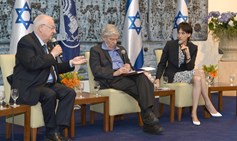
Justice Aharon Barak's Opinion Illuminated What the ICJ Missed
Written By: Prof. Suzie Navot,
While the ICJ decision briefly mentions the immediate context of the lawsuit, namely the Hamas attack on October 7, 2023, Judge Barak directs them to the full picture that they did not address. He writes about the events of October 7 as Israelis know them to be true.
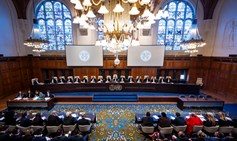
On the Delicate Balance of the ICJ Decision on Temporary Measures
Written By: Prof. Yuval Shany
While neither Israel nor South Africa achieved a complete win, one thing is clear: the story of Israel before the ICJ is only beginning
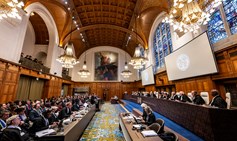
Statement on the ICJ Decision On Provisional Measures
Written By: Prof. Amichai Cohen
Prof. Amichai Cohen, a senior fellow at the Israel Democracy Institute and an expert in international law, made the following comments on the International Court of Justice (ICJ) decision today regarding provisional measures in the case of South Africa v. Israel on the Application of the Genocide Convention.

ICJ Provisional Measures in South Africa v. Israel
Written By: Prof. Yuval Shany
On Friday, January 26, the International Court of Justice issued its Opinion granting provisional measures in South Africa’s genocide case against Israel. Joining the Just Security Podcast to discuss the Court’s Opinion and its implications are law professors Adil Haque, Oona Hathaway, and IDI's Yuval Shany.
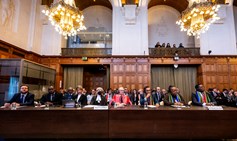
On South Africa's Misinterpretation of Amalek in Jewish Tradition
Written By: Adv. Shlomit Ravitsky Tur-Paz
Beyond the fact that the Torah does not make the call to commit genocide, the Tanach and its interpretations in fact obligate the Jewish people to abide by the laws of war. To a large extent, humanity's earliest laws of war can be found in the Bible.
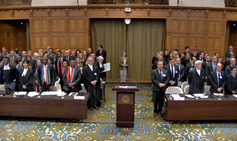
South Africa vs. Israel at the International Court of Justice: A Battle Over Issue-Framing and the Request to Suspend the War
Written By: Prof. Amichai Cohen, Prof. Yuval Shany
The International Court of Justice (ICJ) at the Hague held public hearings in the case against Israel for alleged violations of the Genocide Convention. In this essay we address three aspects of the case: the ways the parties framed the events, the request to suspend Israeli military operations, and the conditions for issuing provisional measures.
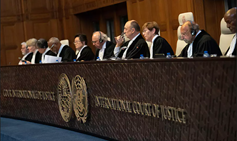
International Court of Justice in The Hague Genocide Proceedings -
Written By: Adv. Shlomit Ravitsky Tur-Paz
One of the claims brought forth in the Application against Israel that it is committing genocide against the Palestinians is that many senior members of the government made references to the biblical precept to wipe out the memory of the ancient Amaleks. This is my professional opinion on the meaning of these locutions and the use made of them in the Application.
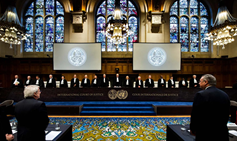
The ICJ Hearings on Israel and the War on Hamas
On January 11th, the court will begin by hearing South Africa’s oral argument, with Israel presenting its counter argument on January 12th.
What does the international law state and what are the possible implications of these proceedings on the ongoing war and Israel’s international standing? We’ve compiled a shortlist of important information you should have.
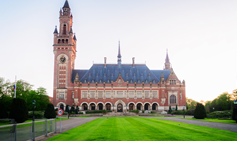
Explainer: South Africa’s Case Against Israel at the International Court of Justice
Written By: Prof. Amichai Cohen
The ICJ is hearing allegations that Israel has violated the Convention on the Prevention and Punishment of the Crime of Genocide. What is the ICJ? How is the government responding? What are the implications for the war against Hamas and Israel’s international standing?
All the answers in a special IDI explainer.

Is Israel Doing Enough to Abide by International Law?
Written By: Prof. Amichai Cohen
IDI's Prof. Amichai Cohen answers a series of questions on international law and its dealings with the laws of war.

What Does Proportionality in War Mean?
Written By: Prof. Amichai Cohen
IDI's Prof. Amichai Cohen answers a series of questions on international law and its dealings with the laws of war.

What Are the "Laws of Armed Conflict" And Who Is a Legitimate Target?
Written By: Prof. Amichai Cohen
IDI's Prof. Amichai Cohen answers a series of questions on international law and its dealings with the laws of war.

What Does International Law Have to Say Regarding War?
Written By: Prof. Amichai Cohen
IDI's Prof. Amichai Cohen answers a series of questions on international law and its dealings with the laws of war.

What Is International Law and is Israel Obliged to Abide By It?
Written By: Prof. Amichai Cohen
IDI's Prof. Amichai Cohen answers a series of questions on international law and its dealings with the laws of war.
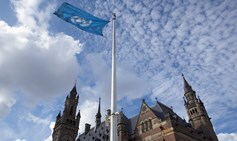
Selective Use of Facts and the Gaza Genocide Debate
Written By: Prof. Yuval Shany, Prof. Amichai Cohen
The recent application by South Africa to the International Court of Justice brought against Israel under the Genocide Convention illuminates how international law and international institutions can be employed to address the Israel-Hamas war.
